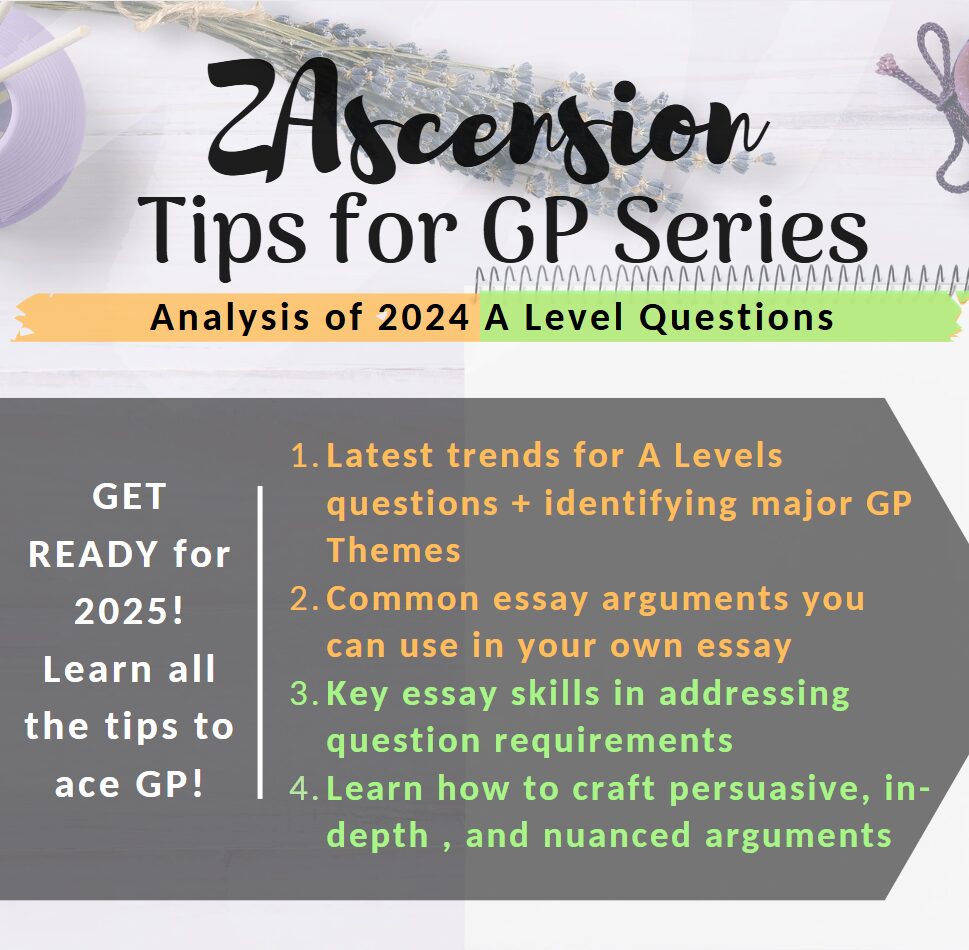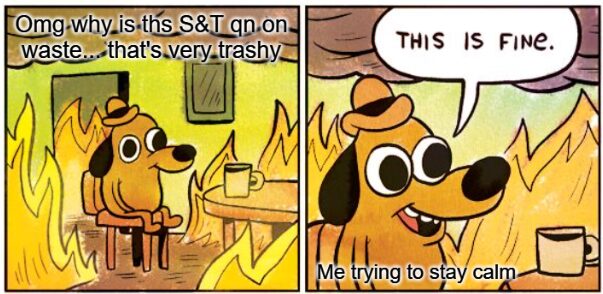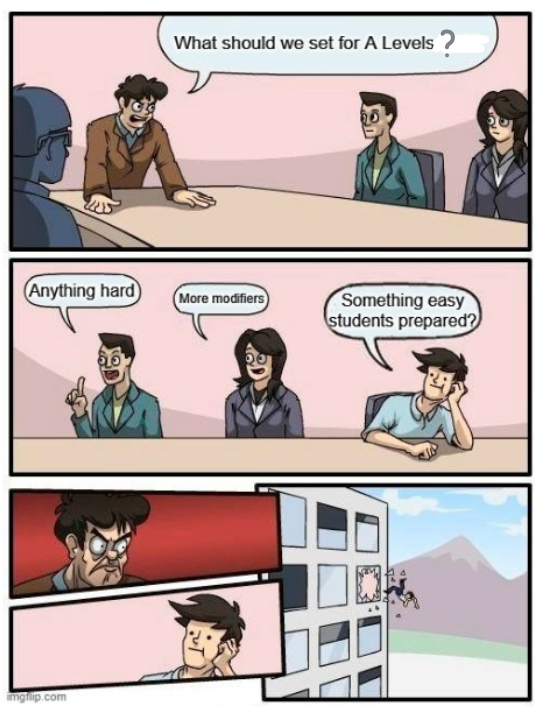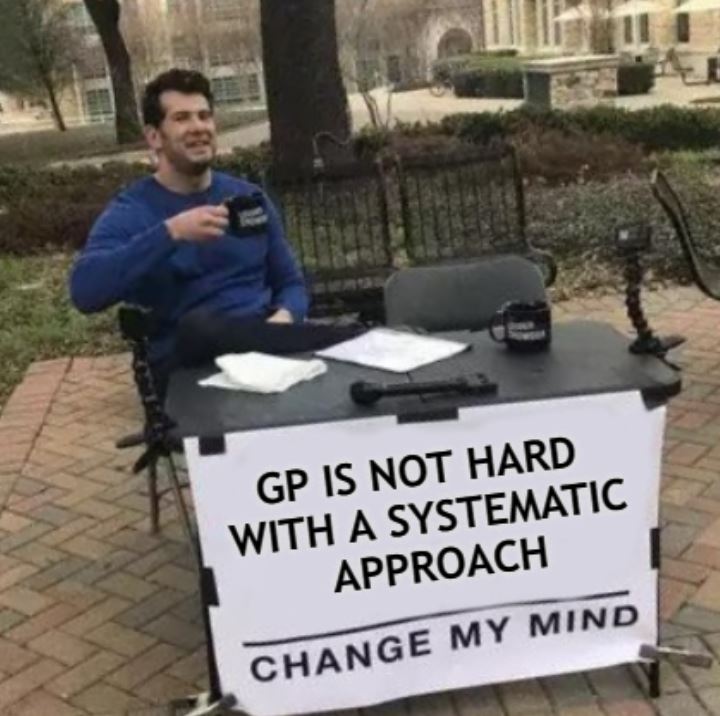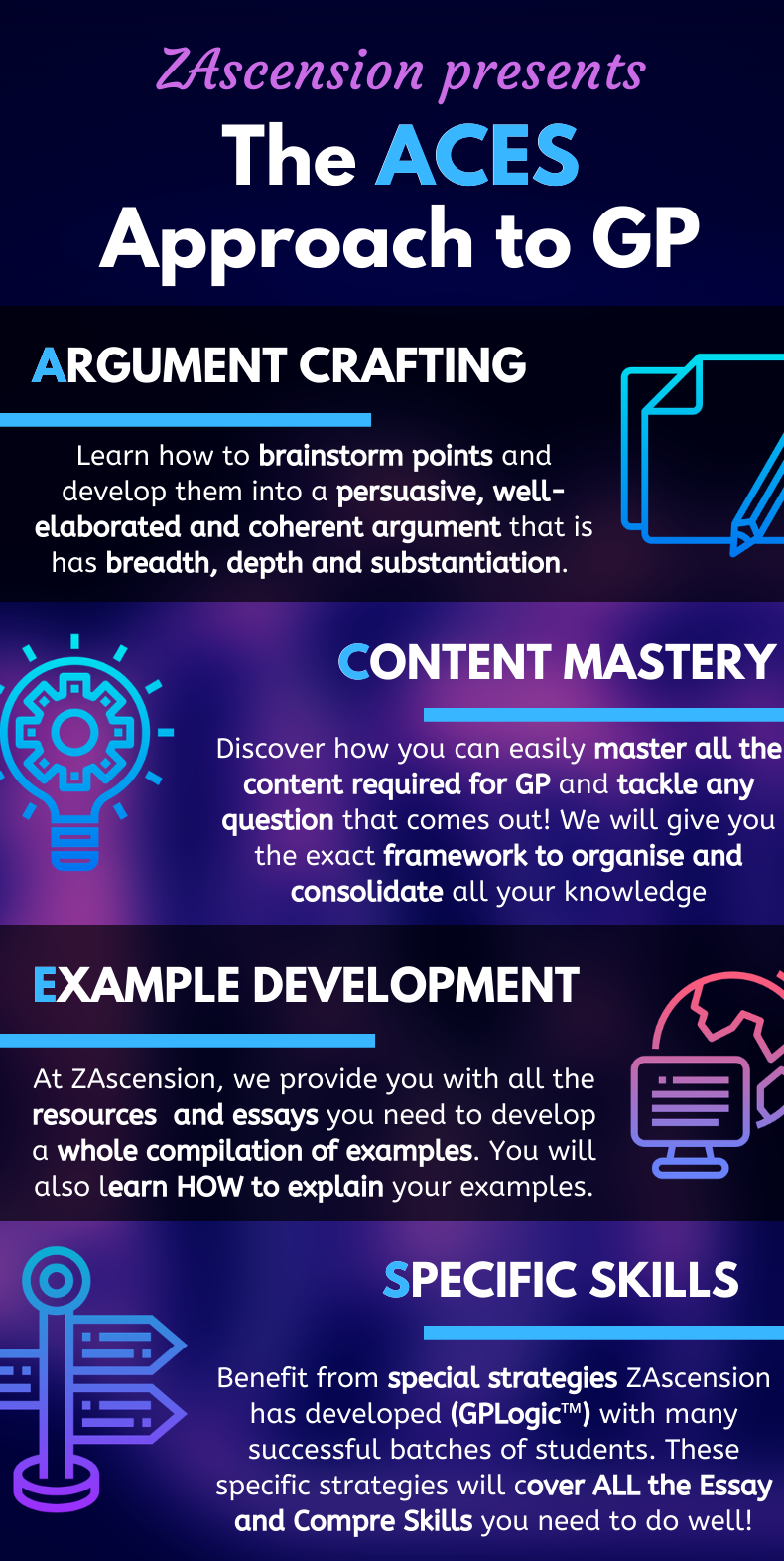GP Essay Questions from 2024 A Levels
1. To what extent are science and technology able to solve the problem of waste disposal?
2. How desirable is it for a country to provide free healthcare for all its citizens?
3. Evaluate the measures taken in your society to deter crime and punish criminals.
4. ‘Education today should involve more than the study of academic subjects.’ How far do you agree?
5. Assess the view that it is always right to challenge injustice.
6. ‘Online advertisements use increasingly sophisticated methods to target consumers.’ To what extent does this bring more harm than good?
7. ‘Humour is essential for an individual’s well-being.’ Discuss.
8. ‘There is a lack of appreciation for the value of music.’ How far is this true in your society?
Poll (Which question did you attempt): Click here to indicate!
Poll Results: Click here to view the results!
If you want more Tips for GP, do also join this free Telegram channel which would share very helpful Tips, FAQs, and update you when articles are updated/posted 😃
______________________________________________________________________________________________________
General Insights:
Why do A Levels Essay Questions always seem so much more difficult that Practice/Prelim ones? Is it true that they are more difficult? The good news is they are actually easy if we analyse them and think about the strategies!
Strategies = Content + Skills. This two-pronged is exactly what we focus on at ZAscension, helping students acquiring specific Thematic knowledge while developing extensive skills that will greatly enhance the quality of essays.
Here is the spread of 2024 questions according to Themes:
Arts (3): Q5*, Q7*, Q8
Individual & Values (2): Q5, Q7*
Politics (1): Q2
Sci & Tech (1): Q1
Environment (1): Q1
Media (1): Q6
General (2): Q3, Q4
* = Partially related to the Theme, but not a complete fit (requires additional knowledge apart from the standard arguments and examples we learn for that Theme)
Relatively standard questions from major Themes: 5, 7, 8
Questions that are non-standard but still easier to write: 3, 6
Difficult Questions (too niche / many modifiers): 1, 2, 4
Read the analysis below for more details on why these are classified as such! To be clear, difficult questions do not immediately mean we won’t do well. It just means that it takes more for the essay to address question requirements, but if pulled off well, can still be a great piece!
Studying for GP Content through Major Themes is highly recommended
I have always been sharing with students that my approach in Content Knowledge for GP resides in preparing for major themes. It gives us a systematic method of acquiring knowledge that we would need and ensures that our knowledge can directly be applied to questions. Though the syllabus has changed in 2024 and there are only 8 questions. the 2024 GP A Levels has confirmed, once again, the importance of these major themes. The themes stated above are precisely the ones I have identified all along, and you can see that’s how we organise all the past year Prelim and A Level questions too (also aligning with how I design my crash course).
For easy access, here are the links to other past year questions organised based on Themes: 2023 A Levels, 2022 A Levels, 2021 A Levels, 2020 A Levels, 2019 A Levels, 2023 Prelims, 2022 Prelims, 2021 Prelims, 2020 Prelims, Prelims Compilation from different years
For my students attempting the old syllabus, you can read some of my thoughts all the way below (but I will only update these tomorrow). Back to 2024 A Levels, out of the 8 questions, 6 of them belong to the major themes. This is why it is important to be strategic and focus on these major themes instead of working on other niche topics. Out of the 2 General questions: 1 on crime, 1 on education. These 2 questions are very niche topics that cannot be considered Themes because their scope is small and barely come out for the A Levels (looking at statistics from the past 10 years). Excluding this year, crime has 5 while education has 3 – these are out of 12 years, whereas other major themes can easily have more than 15 questions. Based on recent trends, out of the general topics, Crime and Sports are probably the most worth studying for. But that being said, the major Themes are still much better!
The insight from here is that the dominant GP strategy is to take a focused approach in developing a critical understanding of these Themes and the associated issues found in them. Students who have specialised and comprehensive knowledge about a specific theme are always rewarded with questions that directly apply their knowledge.
Embracing less popular Themes and preparing for several key Themes
This year’s questions are more challenging for most students because the trend is that students love doing questions for Sci & Tech and Media. However, the main Sci & Tech question this year is difficult (waste disposal is very niche and would require specific examples relating to environmental technology, preventing students from using their extensive knowledge about other forms of science and technology, more details below). Last year was equally difficult because it was about another very niche issue (space exploration). There is a tendency for students to only focus on these Themes because that is also what their school focuses on. The Media question is about advertising which is not that standard; this type of question was popular many years back and then disappeared. It seems like it now has a resurgence but many students would not have so many examples about advertising to be able to attempt this question well. Hence, I would recommend to also look into other Themes because Sci & Tech and Media are often difficult to answer.
In contrast, themes that are less popular with students (but what I always tell my students to focus on) – Arts, Individuals & Values! The question about challenging injustice is an incredibly standard question that almost all my students attempted because we discussed the arguments and examples for this particular question in-depth in class. How did I know it was coming out? I have analysed 1000+ questions from Prelims and A Levels to be able to understand common questions that commonly feature in the exams 🙂 This is why I am extremely confident in my teaching approach for GP because content I share is always applicable to specific essay questions, and not just general knowledge about random things in the world.
Additionally, Individuals & Values is a Theme I (Mr Zach) created upon analysing question trends, and it is not something that schools typically cover. I created this Theme when I saw huge similarities in questions that can be categorised under here, and it is also something I cover extensively in my yearly Essay Content Crash Course (find out more here). Indv & Values is a great theme to look into because of how frequently it comes out and how simple it is to learn this Theme. For more information, please refer to the past year questions (links provided both in the above paragraph, and all the way below this article). The Themes of Arts and Indv Values are really very worth your time because they always come out and in very standard questions that fit exactly with model essays I have prepared. This tells us that occasionally (and increasingly), the A Levels would purposely make popular themes like Sci & Tech and Media harder, so as to differentiate students. Conversely, they would set questions from other less popular themes to encourage a shift into focusing on these. This would mean that it is important to also look into Themes other than just Sci & Tech and Media. Future students who are looking back at learning points for this year – please do try and attempt other Themes too, at least as backup, because this same problem also existed in 2022.
Environment has also returned for another year after 3 years of having 0 questions in the A Levels (2018, 2019, 2021). 2022 had 2 questions, 2023 had 1, 2024 had 1. I was considering removing this as a major theme because of how it seldom comes out but perhaps this is an indication that environmental issues are once again becoming a priority in the A Levels. However, the question is a difficult one because it is only on the issue of waste management, which precludes discussion on the many other diverse aspects like: deforestation, resource depletion, loss of biodiversity, flooding and displacement, carbon footprint, energy sources etc.
I think it is a very clear signal that the A Levels are highly unpredictable. What is common in one year could easily be uncommon the next year. This speaks volumes about the need to study for several major themes so that we can be more prepared for such tricky situations. This becomes even more critical for the new syllabus because having 8 instead of 12 questions (a 33% decrease!) means that we really have way fewer choices.
I would like to add that the new syllabus actually has the exact same questions as the old one, except that the old one has another 4 extra questions. This effectively shows us that all the question trends from the past 10-12 years are still very relevant because content for GP has not changed!
Skills are important to help us address varied questions requirements
Question requirements are often complex with modifiers (additional requirements) and there could even be more than one modifier.
Interestingly, 7 out of 8 questions this year have at least 1 modifier, and some questions even have multiple variables (aligns with recent A Level trends). This demonstrates the importance of properly analysing questions such that we sufficiently address all the additional requirements 🙂
Q1: Variables (S&T + Waste disposal), Extent | Q2: Absolute (free, all citizens) | Q3: Context (in your society) | Q4: Context (today), Variables implied (more than the study of academic subjects = what are other goals?), Extent | Q5: Absolute (always right) | Q6: Extent | Q7: None 🙂 | Q8: Context (in your society)
Context: Q3, 4, 8 | Absolute: Q2, 5 | Variables: Q1, 4| Extent: Q1, 4, 6
Here is a quick summary of the skills needed (CAVE):
Context = Examples and arguments need to reflect the context/condition and not just ignore it. This includes ‘in your society’ questions because they are only looking at the specific context of Singapore. Other common contexts include ideas about today’s world (Q4) which requires us to consider what are some characteristics that would define today’s context, especially pertaining to the specific issue given in the question. In other words, how does today’s world affect the way we think about education, or what we value in education?
Absolute = One view needs to express the absolute. The other view questions the absolute by looking at its limitations or by considering other alternatives to it. For example, for Q5, Agree = always right, Disagree = sometimes wrong. Take note only 1 view has the absolute, not both views. With reference to Q4 again, we would not say Disagree = never right; the absolute is only found in the Agree view. Q2 has double absolutes which means our argument for that view needs to be even more extreme – free (absolute 1) healthcare, not just subsidised + for all (absolute 2) not just some
Variables = Both variables always have to be addressed together, in each argument/example. This is one of the most challenging modifiers to address because a lot more need to be explained. We have to remember to always keep a vigilant lookout for the existence of such additional requirements, instead of eagerly jumping into thinking of points! Look at the following section for more details.
Extent = Need to show how both views could be valid to a degree. Avoid phrases like ‘I agree to a small/large/certain extent’ because they are too vague. Instead, give the specific extent of why you have chosen one view over the other. For example in Q7, a possible stand would be: ‘While the authenticity of human interaction has been undermined in some interactions, it is still important to acknowledge that modern communication devices have generally enhanced the quality and richness of connections’. This would signal that the dominant view is ‘Disagree’ (= disagree to a large extent, but phrased in a much more evaluative and specific manner).
Questions with multiple variables are common curve balls
Q1: Sci & Tech, Waste disposal (Environment)
Many students are probably very annoyed with this question (I also saw many complaints on Reddit after the exams haha). It is quite imaginable why: this question forces us to ignore many other more general arguments and examples about Sci & Tech. Instead, we would need specific knowledge from Environment. Worse still, it’s specific knowledge about waste disposal which is a niche issue within the theme of Environment. This makes the question incredibly challenging. However, you can see from my suggested points below that actually we can still tweak based on common arguments we know for Sci & Tech!
With regard to the variables here, the key to addressing them is to understand that the Scope of our essay has expanded into additional areas of concern. Q1 needs us to think about how the use of S&T impacts waste disposal and we would need to keep comparing between the two. Essentially, we cannot have something that is only about waste disposal without any links back to S&T (for e.g. talking about Fukushima nuclear waste without any reference back to how tech contributed to it) or something that only has S&T without waste disposal (e.g. explaining that AI has enhanced sustainability efforts but not saying anything about waste)
Multiple variables questions are harder because we have additional requirements to consider. Note that every single body paragraph (BP) needs to address both variables and compare them. The common mistake is to separately discuss them across different paragraphs; it is problematic because the arguments would lack the comparative element.
______________________________________________________________________________________________________
If you want more Tips for GP, do also join this free Telegram channel which would share very helpful Tips, FAQs, and update you when articles are updated/posted 😃
Specific Analysis:
I will be analysing each question for their unique requirements, highlighting some pertinent issues, and sharing possible arguments. Disclaimer: these would of course not be the only points that are accepted. If you thought of a different point, it might be a strong argument too, don’t worry just because it is not found here. I just wanted to share some points to open up perspectives on how we can approach these different 2023 questions.
I have also included a part of ‘why does this question exist’. Cogitating on this question allows us to more critically examine the issue to consider the tensions that exist within and identify the central concerns. This year, I am also adding a new section for ‘Rating’ to discuss how challenging a question is. For simplicity, I will also have 2 categories of either ‘difficult’ or ‘standard’.
1. To what extent are science and technology able to solve the problem of waste disposal? | Rating: Difficult
- Why it exists: The relationship between technology and environment are always paradoxical. S&T contributes to a lot of e-waste due to products being created and disposed at an unprecedented rate. Yet, a lot of our solutions for sustainability also come from creatively employing S&T, which includes waste management!
- This is difficult because we cannot use many of the standard arguments and examples we know about S&T. It also requires us to consider the second variable and give it equal importance in our discussion: waste harming the environment. This means that we need very niche examples about this field
- Also, to have sufficient scope means we need to think about the many different kinds of waste – food, nuclear, electronic, industrial, medical etc.
- Agree (Able to solve) = 1. New purposes for waste to reduce its scale – Tech advancements can creatively find new purposes for waste (variables comparison) which turns them into useful resource rather than being dumped in the landfills (examples: recycling, turning food waste into energy). This simultaneously curtails the consumption and extraction of new resources. Another sub-point to discuss here is tech’s ability to clear up waste (e.g. nuclear or industrial) | 2. Diminishes impact of waste – Innovation in materials science can engender the development of biodegradable and compostable products, reducing the environmental impact of waste (variables comparison). This is an interesting argument to consider because it adds scope in showing it is not just the quantity of waste, but also the impact on the environment (which is more qualitative).
- Disagree (Not Able to Solve) = 1. Culprit for more waste – While S&T are promising solutions, they are paradoxically the culprit for more waste too (variables comparison). Consider tech increasing consumerism at an exponential scale which contributes to more consumption and disposal, as well as companies that introduce planned obsolescence of tech products to justify product ‘upgrades’. Tech products also contribute significantly to growing e-waste | 2. Inaccessibility and digital divide – Technological solutions can be expensive and may not be accessible to all, particularly in developing countries. Lacking resources limits their ability to implement effective solutions (variables comparison). This also plagues marginalised communities who often bear the brunt of the detriments of waste, and still have the least access to tech-driven waste disposal facilities.
- New vs Tweaking: A1 and 2 are new points for this question. D1 and 2 are points tweaked from our standard model essays (S&T) 🙂
2. How desirable is it for a country to provide free healthcare for all its citizens? | Rating: Difficult
- Why it exists: Healthcare is a necessity but is often expensive. Many welfare states in the world provide free healthcare but yet there is a concern that this breeds complacency where individuals do not take adequate responsibility for their own health and make poor choices. Free healthcare for ALL also pose a substantial cost that the government would incur, which translates into higher taxes.
- The absolute of ‘ALL its citizens’ is important here. Our arguments should not only discuss the benefits of free healthcare. Rather, we need to consider the added degree of it being free for ALL. ‘Free’ is also absolute because it is not just subsidies or cheaper healthcare. Observe how I address these below.
- Agree (Desirable) = 1. Increased equality and social contract – Free healthcare can help to reduce health disparities between different socioeconomic groups, ensuring that everyone has access to quality care regardless of their income or social status. This allows the government to effectively fulfill its social contract of looking out for all citizens, especially those who have difficulties affording a basic necessity | 2. Productivity and reducing burden on the system – A healthy population is a productive population that can work more efficiently and contribute to the economy. Giving free access to all prevents the spread of diseases, and encourages early interventions to prevent problems from escalating into more serious conditions, thereby alleviating the potential burden on the healthcare system. Making healthcare completely free removes all obstacles in accessing healthcare.
- Disagree (Undesirable) = 1. Increased government expenditure and potential abuse – Implementing and maintaining a free healthcare system can be costly, requiring significant government spending and potentially leading to higher taxes. It may even breed inefficiencies where individuals abuse the system and do not take enough personal responsibility for their own health. Subsidies may be a more sustainable alternative in the long run, rather than a blanket policy of free healthcare for all. | 2. Benefits of private healthcare complementing (hybrid system) – The extent of free healthcare should only apply to government-based public facilities, and perhaps mean testing should be conducted to limit free healthcare to only lower income groups. Private healthcare providers should still be able to charge because profits become incentives to innovate and improve quality, which will also boost the standard of public healthcare in the long run.
- New vs Tweaking: A2, D1 are new points for this question. A1 and D2 are tweaked from our standard model essays (Politics + S&T) 🙂
3. Evaluate the measures taken in your society to deter crime and punish criminals. | Rating: Standard
- Why it exists: The perennial tension lies in reformative vs punitive/retributive, i.e. how harsh should measures be to try and deter crime, consider human rights, yet offering a fair amount of punishment to fit the crime. In Singapore, the death penalty has always been subjected to heavy scrutiny. Beyond that, we need to discuss many kinds of measures in Singapore to address the context.
- Think about characteristics of Singapore and relate that to all the arguments (see below)
- This is a fairly standard question for this topic on Crime & Punishment. As aforementioned, I do not consider this as a major THEME because it is not comparable in terms of consistency in coming out for the A Levels. However, if you have prepared arguments and examples for this, it should be a straightforward question to address, with the only challenge being having enough knowledge about Singapore’s justice system.
- The question’s phrasing needs some thoughtful consideration. Evaluate means we need to figure out both views clearly. Agree = Measures are positive and effective, Disagree = Measures are negative and lacking
- Agree (Positive/Effective) = 1. Fast and fitting measures – Singapore’s justice system is renowned for its efficiency and speed. Cases are often processed quickly, with trials concluding in a matter of days or weeks. Furthermore, there is also a reputation for laws in Singapore being strict and punishments being sufficiently harsh. All these measures send a clear signal that crime is not tolerated in Singapore and criminals will face severe consequences. | 2. Fair and incorrupt – Singapore’s strong anti-corruption framework, coupled with the system’s integrity and transparency, entail that measures are administered fairly and impartially. This means that criminals will receive a fair sentence, and cannot use their power to bribe and escape justice.
- Disagree (Negative/Lacking) = 1. Human rights concerns – Activists may argue that Singapore’s harsh punishments may violate human rights principles. These punishments can be seen as excessive and disproportionate to the crimes committed. They may also not show enough consideration to the extenuating circumstances for criminal activity. | 2. Insufficient focus on rehabilitation – Having strict measures are also tantamount to a lower emphasis on reformative sentences. While there are rehabilitation programmes available, these are still relatively fewer than some other countries, raising questions on whether the justice system provides sufficient room for reintegration.
- New vs Tweaking: All new because this is not from a major theme.
4. ‘Education today should involve more than the study of academic subjects.’ How far do you agree? | Rating: Difficult
- Why it exists: There are always discussions on how education can be improved to think about many other areas, beyond the current fixation on academic content. Yet, the reforms often do not represent a very drastic change because we still recognise the value that studying academic subjects can bring.
- This is difficult because it is one of the two general questions in 2024 that does not relate to major themes that students typically prepare for. Hence, even coming up with arguments can be tough under exam conditions if we have never thought about this issue before. Additionally, the many modifiers here mean that it is very easy to not fully address their diverse requirements. For instance, the implied comparison needed because of “more than the study of academic subjects”, which requires students to examine what exactly are the other focuses and methods of education.
- Stronger scripts would engage with the idea of ‘today’ to outline key characteristics that shape today’s world, including:
- Agree (No censorship) = 1. Holistic development and real-world skills – A well-rounded education includes not just academic subjects but also real-world skills like critical thinking, problem-solving, creativity (variables), and communication. This explains why many education systems in the world have been trying to reform their methods and educational objectives to incorporate more focus on 21st century core competencies, aligning with skills that today’s VUCA world (context) today value. | 2. Values, attitude, shaping character – Far from only focusing on academic subjects and content, education should prioritise the development of values that students have which would be invaluable for navigating the challenges and complexities of today (context). First, education should focus on empathy (variables) give the diversity in today’s globalised world, as well as the very polarised environment (context) for socio-political issues across the world. Second, education need to also cultivate ethics (variables) because technology has increased the amount of ethical considerations (context) that need to be factored in.
- Disagree (Some censorship) = 1. Strong theoretical foundation – Academic subjects equip individuals with the necessary knowledge to discern information. Given today’s climate of pervasive disinformation, students can have the facts needed to evaluate information they come across. | 2. Rigour as an educational outcome – The rigour of academic subjects acts as a crucible, refining minds and revealing hidden talents. By pushing students to their limits, academic challenges expose their strengths and weaknesses, allowing them to identify their true passions and potential. This process not only helps society identify future leaders, innovators, and critical thinkers but also empowers individuals to discover their unique abilities.
- New vs Tweaking: All new because this is not from a major theme. However, A2 is linked to Arts, Indv & Values, Sci & Tech. D1 is linked to Media 🙂
5. Assess the view that it is always right to challenge injustice. | Rating: Standard
- Why it exists: Challenging injustice definitely makes sense given that it is a human rights violation and it is creating a more inclusive and equitable society. However, the costs incurred may not be worth it or the way we approach it may be somewhat flawed.
- This is a very standard question that many of my students have attempted because I covered the exact question in weekly lessons and also in the Content Crash Course (if you are reading this and preparing for A Levels in 2025/26, you should consider joining us to enjoy such effective and targeted approach at mastering GP Content) 😊
- In fact, if I were a student, I would definitely have chosen this! It is a very simple question that also allows for a lot of personal voice when we discuss these issues, very easy to score. In my opinion, this is the easiest question from 2024.
- Agree (Always right) = 1. Social progress – Throughout history, social change has often been driven by individuals who dared to challenge the status quo. By questioning unjust systems and practices, we can create a more equitable and just society. Confronting discrimination and oppression is a profound catalyst for improving society, and this direction is something we should invariably strive for (absolute) | 2. Moral imperative and empowering the marginalised – Injustice comes with egregious and deplorable moral transgressions and human rights violation. Challenging injustice is a moral obligation that should always be undertaken (always) if we want to protect fundamental human rights. Furthermore, being silent will always be tantamount to being complicit (absolute) because it allows status quo to perpetuate. This traction helps to illuminate the voice of the marginalised and make them feel less alone.
- Disagree (Not always right) = 1. Danger and risks – In some cases, challenging injustice can be dangerous and may lead to negative consequences. From social ostracism to physical harm, those who dare to speak truth to power may face severe consequences. Furthermore, in oppressive regimes, dissent can be met with brutal force, leading to imprisonment, torture, or even death. Insofar as challenging injustice is morally right, it may not be practically advisable from a self-preservation perspective. | 2. Limited effectiveness and may backfire: Direct confrontation, while sometimes necessary, can often backfire, exacerbating tensions and hindering progress. A more nuanced approach, such as dialogue, negotiation, and compromise, can be more effective in resolving conflicts and achieving lasting change. Engaging different parties in a conversation could sometimes be more productive than confronting injustice head-on.
- Note that we ‘not always right’ should be interpreted as not always being the best decision, rather than it being wrong. It doesn’t make sense (or would be very unconvincing) to say challenging injustice is wrong given that injustice is something obviously problematic.
- New vs Tweaking: All arguments are directly tweaked from Arts and Indv & Values. Arts is relevant because a huge and core purpose of the arts is social commentary and illuminating existing failings. As highlighted, this can be easily answered with our model essay arguments! There will always be at least 1 such question in the exam because of how I have curated the important questions to look at in our model essays. Again, check out the crash course if you would like to learn these 🙂
6. ‘Online advertisements use increasingly sophisticated methods to target consumers.’ To what extent does this bring more harm than good? | Rating: Standard
- Why it exists: Advertisements provide information while also driving consumer action and demand. These techniques have indeed become increasingly complex due to new media and even more so with the advent of AI-driven algorithms. However, it could also dictate the kind of information that an individual is mostly exposed to, thereby inducing some ramifications.
- Historically (many years 6-12 years back), such questions on advertising are quite common in the theme of Media. These days, I have not seen it much but it does occasionally come up in the prelims too. The focus on online ads definitely aligns with current question trends being more interested in new media
- This is a fairly standard question given that we can tweak from other Themes too, and also use a lot of standard Media knowledge to address it
- An easier way to address this question is to go beyond the scope of just ordinary advertisements that companies launch. The question is thinking about “online advertisements” which could include political advertising, non-profit campaigns etc. This allows for the discussion of more refreshing points
- Agree (More harm) = 1. Personalisation and effectiveness – By tailoring advertisements to individual preferences and behaviors, businesses can provide a more engaging and satisfying browsing experience, especially in a climate of information overload. This targeted approach not only benefits consumers by reducing ad fatigue but also maximises the effectiveness of advertising campaigns for businesses. | 2. Social impact for specific causes – There are causes relating to marginalised or minority communities that may often be overlooked by the majority. Targeting them at consumers increases the recipient’s receptiveness and enables organisations to reach out to groups that are more interested in such a cause.
- Disagree (More good) = 1. Filter bubbles and echo chambers – Targeted advertising can create echo chambers, where users are only exposed to information that confirms their existing beliefs. This can limit exposure to diverse perspectives and hinder critical thinking. This is worsened by the trend of AI-driven algorithms which further cement such echo chambers and contribute to very skewed and unthinking. perspectives | 2. Unethical exploitation and mental health detriment – Sophisticated advertising techniques can be used to manipulate consumer behavior and exploit vulnerabilities. This can lead to impulsive purchases and financial strain. Moreover, constant exposure to targeted ads can contribute to feelings of inadequacy and anxiety. The pressure to conform to societal beauty standards and material possessions can negatively impact mental health.
- New vs Tweaking: A1 is a new point for this question. A2 comes from Indv & Values, while D1 and D2 are tweaked from our standard model essays (Media) 🙂
7. ‘Humour is essential for an individual’s well-being.’ Discuss. | Rating: Standard
- Why it exists: Humour is not just entertaining, the question wants us to consider the benefits that could come from this entertainment. On the other hand, humour can also be used wrongly in different cases to create problems.
- I really like this question too. First, it is the only one without modifiers and that makes it much easier. Second, it overlaps extensively with arguments we learn in Indv & Values and Arts, so it is actually very standard when you think more deeply about this. Past year Compre papers also several different passages discussing this issue. It can seem daunting and broad initially, but it is actually a really good question to do!
- Agree (Essential) = 1. Empowerment of the marginalised – Humour can serve as a powerful tool to illuminate the issues affecting marginalised communities. By using satire, irony, or wit, social commentators can expose societal injustices. When humour resonates with marginalised individuals, it can provide a sense of validation and belonging. It can help them to see their experiences reflected in a broader context, and to know that they are not alone. This recognition can be incredibly empowering, boosting self-esteem and mental well-being. | 2. Stress relief – Humour acts as a vital antidote to stress, enabling individuals to lighten their emotional load. By providing a much-needed respite from the weight of life’s challenges, humor allows us to approach problems with a fresh perspective. In a world often dominated by negative news and overwhelming information, humor offers a welcome contrast, helping us to maintain a positive outlook.
- Disagree (Not essential) = 1. Inappropriate and offensive – Inappropriate humor can have severe consequences, as it can be insensitive and inflammatory, often offending people’s beliefs and cultural sensitivities. Such humour can lead to feelings of distress, disrespect, and even anger, negatively impacting mental well-being. When humor is used to mock or ridicule marginalised groups, it can perpetuate harmful stereotypes and reinforce social divisions. | 2. Distraction, not addressing underlying issues – While humour can offer a temporary reprieve from life’s challenges, it can also serve as a superficial distraction from deeper, underlying issues. By focusing solely on the surface-level amusement, individuals may neglect to address the root causes of their problems. This can lead to a cycle of avoidance and procrastination, hindering personal growth and long-term well-being.
- New vs Tweaking: A1 and A2 both come from Arts and Indv & Values when we look at inequality and discrimination. D1 comes from Arts and Media when we discuss why some content or artworks have to be censored. D2 is more of a new point that best relate to this particular question 🙂
8. ‘There is a lack of appreciation for the value of music.’ How far is this true in your society? | Rating: Standard
- Why it exists: The arts in Singapore both receive widespread and underwhelming support in some ways. It is a complex discussion depending on what aspects we look at. Music is interesting because it has mass appeal but we can consider whether listening to music = appreciation. Stronger scripts would understand that there are other issues like appreciating the messages behind music, thinking about it as a career, going for actual live events etc.
- This is also fairly standard. In fact it has come out before in the A Levels (2017 Q8: Examine the role of music in establishing a national identity in your society). This is a variation of that. We are still looking at music in Singapore’s context but instead of thinking about its impacts on national identity, we consider people’s attitudes towards music. The examples could be very similar!
- Take note that this is a ‘in your society’ question (there are always 2 every year). Think about characteristics of Singapore and relate that to all the arguments (see below)
- Agree (Lack of appreciation) = 1. Lack of formal training – While music education is offered in local schools, it often takes a backseat to core academic subjects like mathematics and science. This lack of emphasis on music education can limit exposure to diverse musical genres and hinder the development of musical appreciation and skills. Many Singaporeans may lack the formal training to appreciate the nuances and technicalities of music that precludes a deeper appreciation | 2. Societal perception and pragmatic limitations – Furthermore, the appreciation of music mainly resides in consuming not producing. The general expectation of Singapore society for individuals to opt for more mainstream jobs over creative careers linked to the arts would also curtail the development of local musicians. The small domestic market also means that pursuing a local music career becomes much more difficult. Hence, the appreciation of music does not extend into creating and producing it as an actual career.
- Disagree (Sufficient appreciation) = 1. Vibrant music scene – Singapore has emerged as a vibrant international hub for music, hosting a wide range of concerts, festivals, and musical performances. From global pop sensations to theatre musicals and local indie bands, the city-state attracts music enthusiasts from around the world. These events, often held at iconic venues like the Singapore Indoor Stadium and the Esplanade – Theatres on the Bay, consistently sell out, demonstrating the strong demand for live music experiences. (Examples: Think about the recent Taylor Swift, Coldplay, Jay Chou concerts, or other famous musicals like Hamilton and Wicked) | 2. Government and public support – The government has also demonstrated significant commitment to fostering a thriving music scene, including investments in venues, events, and developing local talents. Singaporeans have also been relatively generous in supporting music-related events and initiatives. Both top-down and bottom-up support reflect a strong appreciation for music in Singapore.
- New vs Tweaking: A1 and A2 are new points that relate to our model essays from the Arts, but require some level of tweaking to choose the arguments most related to music (instead of other art forms) + frame these in a way that can ATQ. D1 and D2 are direct arguments learned in Arts essays when we discuss whether there is enough attention given to the arts.
______________________________________________________________________________________________________
Yay, congratulations to the J2s of 2024, because you have completed an important milestone. Good job on putting in your best effort for GP. Now it is time to take a short break and refocus your efforts on Compre + other remaining subjects. Stay motivated and stay confident 😄!!
______________________________________________________________________________________________________
If you found this helpful, do check out our GP Tips & Resources Telegram Channel! Click here to join. This channel is meant to act as a GP companion to share knowledge and help all students, regardless of whether they are a part of ZAscension. This resource features Tips of the Day, Answers to FAQs, Articles and many more. So if you enjoyed this article, this channel will definitely be useful for you 😃
Do share this article and also the Telegram channel with everyone you know who is also studying for GP, let’s share the good stuff so that we may all learn 🙂

